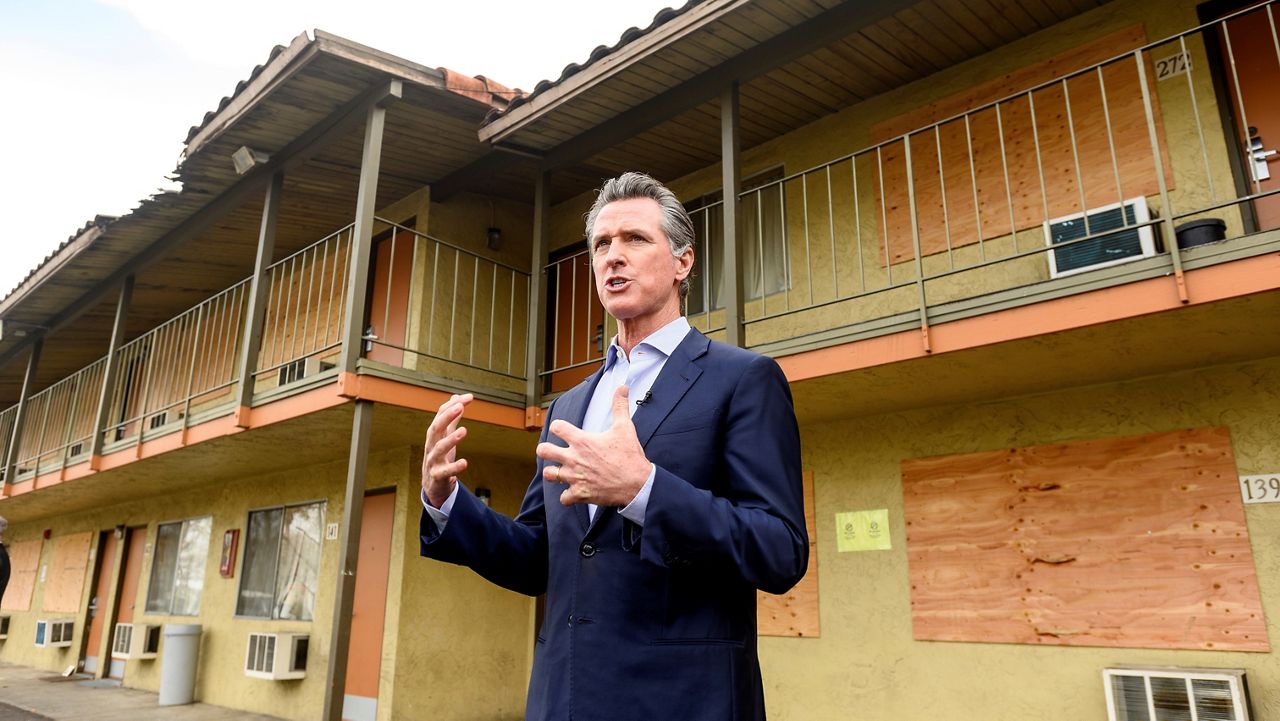SACRAMENTO, Calif. (AP) — California's plans to reduce the nation's largest homeless population aren't good enough, Democratic Gov. Gavin Newsom said Thursday, prompting him to halt $1 billion in state spending for local governments as he seeks to reset the state's strategy ahead of his expected second term in office.
California's homeless population — likely higher than the 161,000 people estimated in 2020 — is one of the state's most pressing and public problems as the high cost of living has only increased the size and number of homeless encampments that dot cities throughout the state.For decades, California's state government has viewed homelessness as a local issue, handing cities and counties tens of billions of dollars to design and run programs aimed at getting people off the street and into permanent housing. That included a recent commitment by state lawmakers to spend $15.3 billion over the next three years.
But the state's homeless population seemed to grow in concert with increased state spending, frustrating officials. California's counties, 13 largest cities and groups of homeless service providers were in line to receive about $1 billion in state homelessness spending, but only if they submitted plans on how they would use the money to reduce the number of unsheltered homeless people.
On Thursday, Newsom declared those plans were “simply unacceptable” as they would collectively reduce the state's homeless population by just 2% over the next four years. He said he would pause spending until after a meeting with local officials this month to “review the state’s collective approach to homelessness."
“At this pace, it would take decades to significantly curb homelessness in California,” Newsom said in a news release. "Everyone has to do better — cities, counties, and the state included. We are all in this together.”
Local leaders were not happy.
“Now is not the time to play politics when people’s lives are at stake," said Carolyn Coleman, executive director and CEO of the League of California Cities. “Failing to release state funding will not put roofs over the heads of Californians or deliver desperately needed supportive services.”
Sacramento Mayor Darrell Steinberg said he shared Newsom's frustration but that his city needed the funds to maintain more than 1,100 shelter beds. In Oakland, Mayor Libby Schaaf, who leads a coalition of mayors of the state’s 13 largest cities, said her city followed the state's process as instructed.
In San Jose — the 10th largest city in the U.S., with more than 1 million residents — Mayor Sam Liccardo said if Newsom wanted to be bold in solving the homeless crisis, he would dedicate 10% of the state's recent historic budget surpluses to build housing and require homeless people to take permanent housing when it is offered, among other reforms.
“Let's put down the megaphones and pick up the shovels,” Liccardo said.
In the state Legislature, Senate Republican Leader Scott Wilk criticized Newsom for taking too long to act, while Democratic Assemblymember Jim Wood said he “wholeheartedly applaud(s)” the move.
“The money is not going to go very far and you’re not going to make much of a dent unless you figure out a different way to do things,” Wood said.
A common plea echoed by mayors and advocates for the homeless was the need for dedicated funding so cities and counties can plan ahead and ramp up the number of people they expect to help.
Chione Flegal, executive director of Housing California, said $1 billion sounds big but it's a “drop in the bucket relative to the incredible need folks are facing.” She said there also needs to be massive investment in public health, affordable housing stock and the social net to really solve homelessness.
Newsom is running for reelection this year and is likely to win a second term as he faces a little-known Republican state senator. But Newsom's political future, including a possible run for president, could be complicated by California's persistent homelessness crisis.
Since taking office in 2019, Newsom has been more aggressive in setting and enforcing a statewide homelessness policy. In 2019, the Newsom administration sued the Southern California city of Huntington Beach, accusing local officials of ignoring the state's affordable housing requirements.
Earlier this year, the Newsom administration launched a first-of-its-kind investigation of San Francisco's housing policies aimed at figuring out why it takes officials there so long to approve housing projects. And last month, the Newsom administration and the state attorney general joined a lawsuit against the city of Anaheim alleging officials there violated state housing laws.
In the past year, the Newsom administration says it has cleared 1,600 homeless encampments, cleaning up 2,227 tons of trash, enough to fill more than 40 Olympic-sized swimming pools. He also signed a new law that will let judges force some homeless people into treatment — a controversial proposal opposed by civil rights advocates who say it goes too far.
Advocates for the homeless say compelling treatment when there are not enough beds or services and cleaning up encampments will not seriously reduce the number of unhoused people in California.
“People experiencing homelessness are not garbage to be thrown away,” Flegal said.




